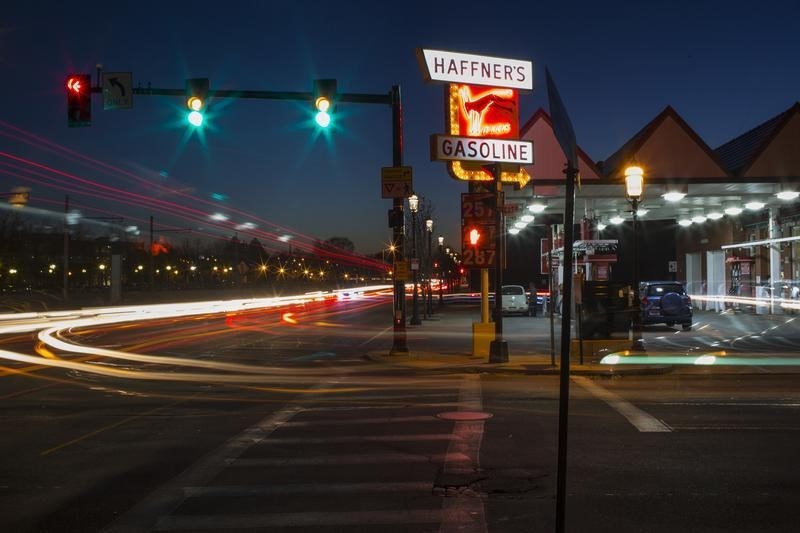By Seng Li Peng and Aaron Sheldrick
SINGAPORE, March 17 (Reuters) - Oil prices rose more than $1
on Tuesday as the recent sharp falls due to the coronavirus
pandemic encouraged bargain hunters to come forward, although
the market remains volatile as the spread of the infection
disrupts economies and hurts demand.
Brent crude LCOc1 was up by 1.5%, or 46 cents, to $30.51 a
barrel by 0206 GMT, after hitting a high of $31.25.
U.S. West Texas Intermediate (WTI) crude CLc1 rose 3.2%,
or 92 cents, to $29.62, having come off a high of $30.21.
"Presumably, the market is getting supported by physical
bargain hunters and short covering," said Stephen Innes, chief
markets strategist at AxiCorp.
The United States has said it will take advantage of low oil
prices to fill its Strategic Petroleum Reserve (SPR), and other
countries and companies are planning similar measures to fill
storage tanks.
"But those storage facilities are rapidly filling. If
storage does fill, quashing that demand, oil prices are sure to
collapse further, and the global markets will then have to hope
that the dispute between Saudi Arabia and Russia is resolved
before we reach that point of no return," Innes said.
Amid heavy demand loss from the global spread of the virus
that causes COVID-19, Saudi Arabia and Russia started a price
war after failing to agree to extend their pact to cut output to
support the market.
Saudi Aramco 2222.SE has said this week it would likely
carry over its planned higher oil output for April into the
following month, and that it was "very comfortable" with an oil
price of $30 a barrel.
Several countries - including the United States and Canada,
and nations in Europe and Asia - are taking unprecedented steps
to contain the virus, severely crippling demand for crude and
refined products such as gasoline and jet fuel.
Gasoline refining margins in the United States, the world's
largest gasoline consumer, plunged around 95% on Monday -
briefly turning negative - with fuel prices plunging faster than
crude oil in anticipation of coronavirus prevention measures
keeping people off the road and in their homes.
- English (USA)
- English (UK)
- English (India)
- English (Canada)
- English (Australia)
- English (South Africa)
- English (Philippines)
- Deutsch
- Español (España)
- Español (México)
- Français
- Italiano
- Nederlands
- Português (Portugal)
- Polski
- Português (Brasil)
- Русский
- Türkçe
- العربية
- Ελληνικά
- Svenska
- Suomi
- עברית
- 日本語
- 한국어
- 简体中文
- 繁體中文
- Bahasa Indonesia
- Bahasa Melayu
- ไทย
- Tiếng Việt
- हिंदी
Oil prices jumped $1 as recent sharp falls draw investors

Latest comments
Install Our App
Risk Disclosure: Trading in financial instruments and/or cryptocurrencies involves high risks including the risk of losing some, or all, of your investment amount, and may not be suitable for all investors. Prices of cryptocurrencies are extremely volatile and may be affected by external factors such as financial, regulatory or political events. Trading on margin increases the financial risks.
Before deciding to trade in financial instrument or cryptocurrencies you should be fully informed of the risks and costs associated with trading the financial markets, carefully consider your investment objectives, level of experience, and risk appetite, and seek professional advice where needed.
Fusion Media would like to remind you that the data contained in this website is not necessarily real-time nor accurate. The data and prices on the website are not necessarily provided by any market or exchange, but may be provided by market makers, and so prices may not be accurate and may differ from the actual price at any given market, meaning prices are indicative and not appropriate for trading purposes. Fusion Media and any provider of the data contained in this website will not accept liability for any loss or damage as a result of your trading, or your reliance on the information contained within this website.
It is prohibited to use, store, reproduce, display, modify, transmit or distribute the data contained in this website without the explicit prior written permission of Fusion Media and/or the data provider. All intellectual property rights are reserved by the providers and/or the exchange providing the data contained in this website.
Fusion Media may be compensated by the advertisers that appear on the website, based on your interaction with the advertisements or advertisers
Before deciding to trade in financial instrument or cryptocurrencies you should be fully informed of the risks and costs associated with trading the financial markets, carefully consider your investment objectives, level of experience, and risk appetite, and seek professional advice where needed.
Fusion Media would like to remind you that the data contained in this website is not necessarily real-time nor accurate. The data and prices on the website are not necessarily provided by any market or exchange, but may be provided by market makers, and so prices may not be accurate and may differ from the actual price at any given market, meaning prices are indicative and not appropriate for trading purposes. Fusion Media and any provider of the data contained in this website will not accept liability for any loss or damage as a result of your trading, or your reliance on the information contained within this website.
It is prohibited to use, store, reproduce, display, modify, transmit or distribute the data contained in this website without the explicit prior written permission of Fusion Media and/or the data provider. All intellectual property rights are reserved by the providers and/or the exchange providing the data contained in this website.
Fusion Media may be compensated by the advertisers that appear on the website, based on your interaction with the advertisements or advertisers
© 2007-2024 - Fusion Media Limited. All Rights Reserved.